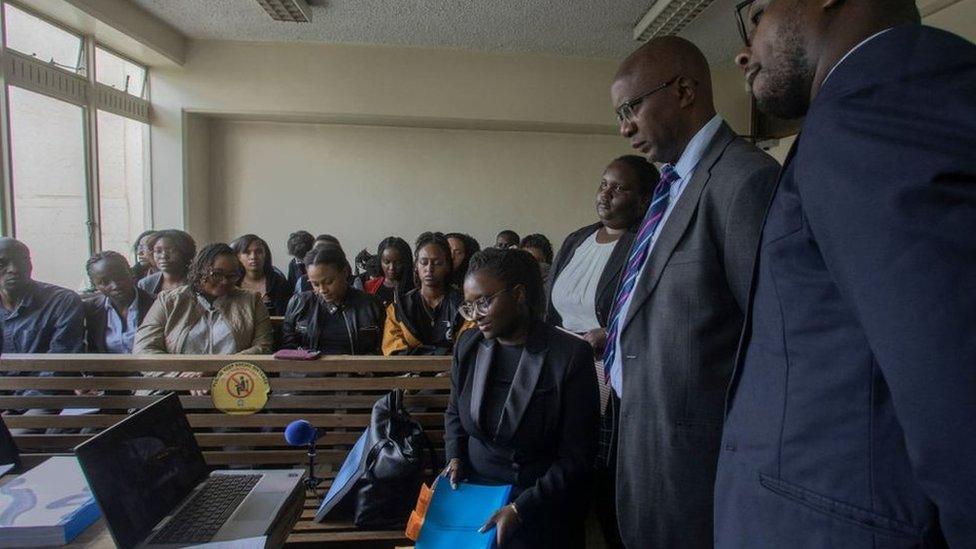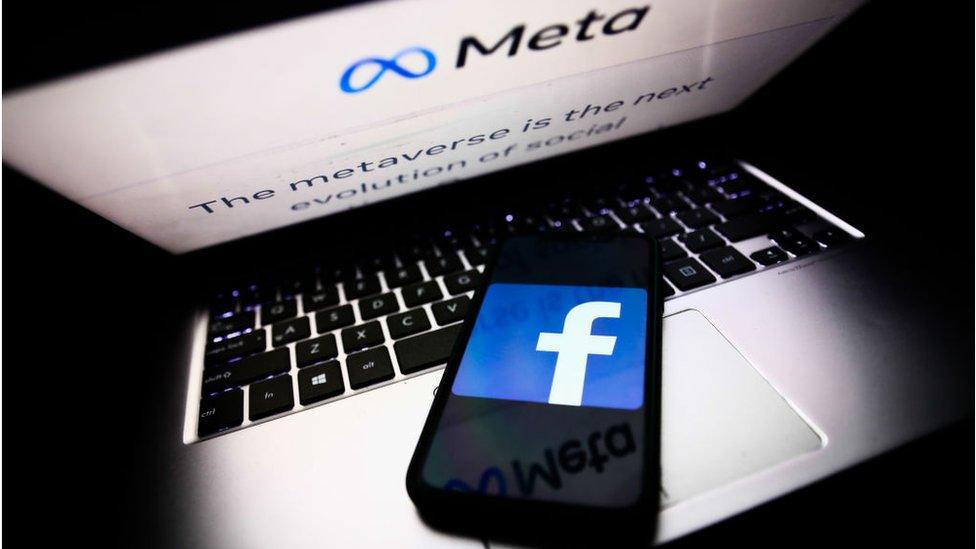Settlement talks collapse in Kenya Facebook redundancies case
- Published

Lawyers for the moderators, during a pretrial legal hearing
Talks aimed at reaching a settlement in a long-running case brought by 184 Nairobi-based Facebook moderators against the platform's owner Meta have broken down.
The moderators, who filtered out violent and graphic content, allege they were laid off for organising a union.
They were made redundant from Sama, a local subcontractor.
Sama has previously told the BBC it has no opposition to unionisation.
The moderators are suing Meta, Sama and another outsourcing firm, Majorel.
Meta uses artificial intelligence to help spot and remove graphic Facebook content, but it also still relies on thousands of human workers to spot problematic posts.
Several moderators have spoken out about the traumatising nature of the content they worked to filter out of people's feeds, for which they were paid about $630 (£515) per month, according to Sama.
One moderator involved in the legal action told the BBC of his distress at seeing a video in which a man took his own life in the presence of a child.
Sama has always maintained it provided good salaries in local terms, as well as mental health support.
In an interview with the BBC in August, the chief executive of the firm, Wendy Gonzalez, denied it had any opposition to unionisation, saying it was "not a concern".
In total 260 moderators were laid off when Sama ended its contract with Meta. The 184 moderators bringing the legal action allege that they were laid off in retaliation for complaints about working conditions and attempts to form a union.
Among their demands they want Meta to give an undertaking that moderators have the right to join a union and to speak out about working conditions.
The moderators also allege they were unfairly refused work at Majorel, the contractor chosen to take on the African moderation work after Sama's exit.
But on Monday it emerged that Meta's work with Majorel will not be going ahead.
"A recent court order means it is not possible for Meta to start planned content moderation work with Majorel in Kenya," Meta told the BBC.
It blamed a court order resulting from the case which banned the firm starting any planned content moderation work with other contractors while the legal action continued.
"We remain committed to Africa, and our content review work in local languages, so we're exploring options with our partners who have a presence on the continent to ensure that we can continue to help keep people safe on our platforms," the company said.
Majorel told the BBC: "Unfortunately, and after careful consideration, today we notified approximately 200 of our employees in Nairobi of the commencement of a potential redundancy process."
But it said it remained committed to helping Kenya develop as a "premier destination" for digital outsourcing.
Serious talks
In August, the parties involved were ordered to pursue an out-of-court settlement through mediation.
That has now failed, meaning that the legal case will continue, though the judge urged the parties to continue with "serious engagement" ahead of the next hearing on 31 October.
Lawyers for the moderators accused Meta of not being committed to the negotiations.
"If they are willing to seriously engage then we are always happy to continue," their lawyer Mercy Mutemi said.
Martha Dark of the campaign group Foxglove, which is supporting the litigation, said: "Meta's timewasting has forced them to go back to court."
But Meta's lawyer argued that the parties had been making progress in the talks.
Sama said in a statement it was "disappointed that the mediation did not lead to a settlement".
It said separate to the court process it had been successful in coming to a mutually agreed resolution with about 60 moderators, which it said demonstrated its "commitment and willingness to find an amicable, beneficial solution".
Meta faces other legal challenges in Kenya.
In February, a Kenyan court ruled that Meta could be sued by ex-moderator Daniel Motaung over claims of poor working conditions.
Meta also faces legal action in Nairobi concerning allegations its algorithm helped fuel the viral spread on social media of hate and violence during Ethiopia's civil war.
Related topics
- Published16 August 2023

- Published25 April 2023
